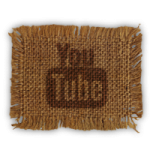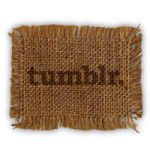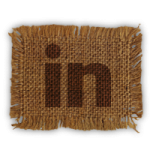
Our Programs
- Credit Plus
- Healthy Periods Initiative
- Gulu Women's Resource Center
- Literacy
- Leadership Development
- Agriculture
Credit Plus
Introduction to Microfinance
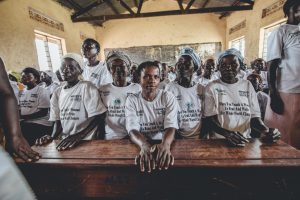 Microfinance can be an effective strategy for alleviating poverty and empowering women. It’s the promotion of small scale entrepreneurship by extending credit to the most impoverished, those who would normally not have access to traditional banking and lending institutions. It uses the idea of group lending, community participation, collective liability and the desire for self-determination. Microcredit has changed the lives of many poor people enabling them to lift themselves out of the dire poverty that exists in much of the global south. Microcredit programs are promoted as a strategy for alleviating poverty and enabling women’s empowerment. WGEF was founded on the belief that while microcredit can be a powerful tool for poverty alleviation, when bundled with social capital building programs, it can be revolutionary.
Microfinance can be an effective strategy for alleviating poverty and empowering women. It’s the promotion of small scale entrepreneurship by extending credit to the most impoverished, those who would normally not have access to traditional banking and lending institutions. It uses the idea of group lending, community participation, collective liability and the desire for self-determination. Microcredit has changed the lives of many poor people enabling them to lift themselves out of the dire poverty that exists in much of the global south. Microcredit programs are promoted as a strategy for alleviating poverty and enabling women’s empowerment. WGEF was founded on the belief that while microcredit can be a powerful tool for poverty alleviation, when bundled with social capital building programs, it can be revolutionary.
Women are the major recipients of microcredit loans because they are a better risk – they have a higher repayment rate and are more responsible with the money. Studies have show that women are more interested and therefore more likely to improve the lives of their children which includes nutrition, health and education. Data also suggests that lending to women has a significant increase in food and non-food expenditures per household suggesting that lending to women increases the health and well being of the entire family.
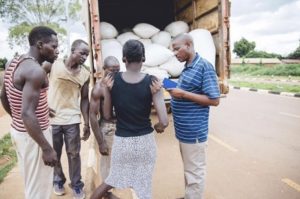 In response, Women’s Global Empowerment Fund has partnered with Volunteer Action Network, creating a funding initiative and social justice project in northern Uganda. Northern Uganda is a post-conflict region, where women and children experienced horrific violence and chronic poverty. The women in our program are former abductees, forced to become child soldiers for the LRA (Lord’s Resistance Army); former sex slaves or ‘wives’ of LRA commanders, have lost many family members, and, for the most part, have been invisible to their government and the global community. The 20 year conflict left the region unstable, lacking in economic activity, and vulnerable to food and human insecurity.
In response, Women’s Global Empowerment Fund has partnered with Volunteer Action Network, creating a funding initiative and social justice project in northern Uganda. Northern Uganda is a post-conflict region, where women and children experienced horrific violence and chronic poverty. The women in our program are former abductees, forced to become child soldiers for the LRA (Lord’s Resistance Army); former sex slaves or ‘wives’ of LRA commanders, have lost many family members, and, for the most part, have been invisible to their government and the global community. The 20 year conflict left the region unstable, lacking in economic activity, and vulnerable to food and human insecurity.
Northern Uganda is in full recovery, with hope for lasting peace and reconciliation are spreading; what is needed now is a comprehensive support package, including access to clean water and sanitation, health services and education. This is where Women’s Global is impacting the community by providing an opportunity for sustainable human development. The women in our program are leading in their villages and communities, feeding their children, and creating viable businesses; the Gulu market is growing and projects are becoming more diverse, with women opening small shops, bakeries, restaurants, hotels; construction projects and small to medium scale agriculture projects creating local food production, addressing food security regionally and nationally.
Credit Plus: A Microfinance and Education Initiative
“I learned how to save money, how to stay with people, share, love, how to handle problems in my home and elsewhere. All this was because of WGEF.” – Client
Women’s Global Credit Plus program combines microcredit services with literacy, leadership development, health initiatives and basic business education into a single service reaching women in poor or rural areas. This integrated approach has been proven to alleviate poverty and empower women.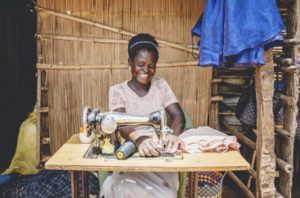
Through our Credit Plus program participants will receive a microcredit loan bundled with social and educational services, allowing them to create an opportunity for sustainability, increased food security and health and nutrition. Each loan recipient will be required to attend weekly or bi-monthly meetings. These meetings will entail loan repayment, and other loan administration details. In addition, classes will be offered in one or more of the following areas: business skills, literacy, health or leadership development. Understanding that Credit Plus is not only an effective tool in alleviating poverty, but empowering women, increasing the health of the family, and creating an environment of self-determination.
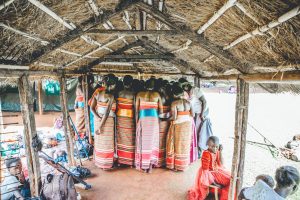 As of May 2022, our Credit Plus program has given 27,000+ loans, basic business training and opportunities to participate in development programs. We made our first loan in April 2008, have experienced rapid growth. Our reputation in the community indicates that we have a meaningful, solid, fair and transparent program, resulting in new groups applying weekly. Several indicators highlight the success of this program and where we are at this point in time. One, we have had no defaults or missed payments; two, many groups have applied for a fourth and fifth loan to expand and grow their businesses, some women are hiring assistants and employees from their villages; three, we have received very positive feedback and support from community leaders, and our clients successfully ran for elected offices in national elections, 2011, 2016 and 2021; and four, we have had impressive turnouts for our trainings, the 9th annual Kikopo Pa Mon Gulu, Creating a Voice for Women in Gulu, drama festival in October, 2016 and the opening of Gulu Women’s Resource Center. Lastly, our literacy program has been recognized by the Ministry of Education, local leaders and have enable women the opportunity to learn to read and write. Our multifaceted approach to the complexities of poverty and inequality have resulted in the economic, social and political growth and success of our clients, their families and the community.
As of May 2022, our Credit Plus program has given 27,000+ loans, basic business training and opportunities to participate in development programs. We made our first loan in April 2008, have experienced rapid growth. Our reputation in the community indicates that we have a meaningful, solid, fair and transparent program, resulting in new groups applying weekly. Several indicators highlight the success of this program and where we are at this point in time. One, we have had no defaults or missed payments; two, many groups have applied for a fourth and fifth loan to expand and grow their businesses, some women are hiring assistants and employees from their villages; three, we have received very positive feedback and support from community leaders, and our clients successfully ran for elected offices in national elections, 2011, 2016 and 2021; and four, we have had impressive turnouts for our trainings, the 9th annual Kikopo Pa Mon Gulu, Creating a Voice for Women in Gulu, drama festival in October, 2016 and the opening of Gulu Women’s Resource Center. Lastly, our literacy program has been recognized by the Ministry of Education, local leaders and have enable women the opportunity to learn to read and write. Our multifaceted approach to the complexities of poverty and inequality have resulted in the economic, social and political growth and success of our clients, their families and the community. 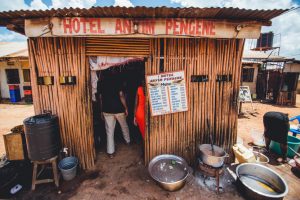
Uganda held national political elections in Jan 2021; WGEF is proud to have had 27 women competing…..21 of them winning. Women are leading, challenging the entrenched patriarchal/political landscape, creating a platform for change and policy development that includes the voices of women at every level of the decision making process. This is the type of systemic change that addresses the stubborn issues of poverty, gender inequity, and the marginalization of women and children.
Healthy Periods Initiative
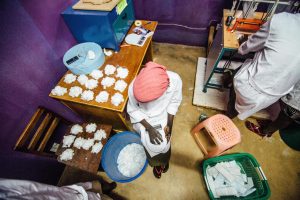 Improving Health, Creating Livelihoods
Improving Health, Creating Livelihoods
To address the issue of menstrual health, and the challenges women face with regards to access, hygiene and socio-cultural stigma, Women’s Global Empowerment Fund launched the Healthy Periods Initiative – improving health, creating livelihoods.
Just imagine attending school without toilets or drinking water. Imagine attending a school with a single latrine for all the students, or that the latrine is smelly, with no toilet paper and the door no longer closes. Just imagine attending one of these schools when you have your period.
Approximately 70% of reproductive diseases are caused by poor menstrual hygiene. In lower income countries, and areas where there is a lack of access to sanitation and water, menstruation is significantly more challenging to manage hygienically and with dignity. Due to the lack of access and affordability of sanitary products, women and girls often use cloth, leaves, mattress stuffing, and other ineffective and unsafe materials. These materials are unhygienic, uncomfortable, ineffective and unacceptable. Period.
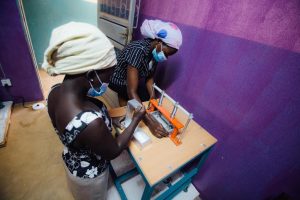
When a girl faces obstacles in managing her menses in a healthy way, she is at risk for infection, her self-esteem and self-confidence suffer, she may remain absent from school during her period, or worse still, drop out of school altogether upon reaching puberty. Over time, these negative effects add up, preventing a young girl from achieving her full potential and having a healthy, productive life. It’s about justice.
The Healthy Periods Initiative drives economic and socio-cultural change through enterprise and education. From a grassroots level, we inform, educate and provide resources to assist in the development of successful social enterprises that provide safe and sanitary resources for all women in their communities.
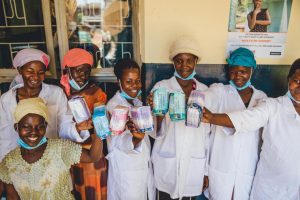
Update: Women’s Global Provides FREE Sanitary Pads to South Sudan Refugees
As of June 2022, WGEF has delivered over 7+ million sanitary pads across the region to the most vulnerable populations; this includes 16 schools across the region, where we deliver pads and menstrual health education every month to school girls who otherwise have little to no access to information.
Our data shows this transformative project is enabling girls to stay in school, study and manage their menstrual health with dignity. Keeping girls in school reduces teen pregnancy, early marriage and provides young women with the opportunity to determine their own future.
In addition, we supply refugee camps, Gulu women’s prison and under-resourced women across the region as needed.
In an effort to provide this essential product to other vulnerable groups, Women’s Global supplies the Gulu Women’s Prison and local schools.
Gulu Women's Resource Center
In partnership with Ultraviolet Edge and Kathryn B. McQuade Foundation
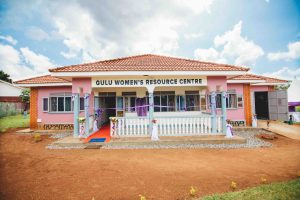
To address the issues of stubborn poverty and the challenges women face regarding access to and information on: health, justice & human rights, gender based violence, economic empowerment, education and activism, Women’s Global Empowerment Fund (WGEF) opened the Gulu Women’s Resource Center (GWRC). GWRC is a one-stop center that will provide essential support, information and education to women and girls in northern Uganda.
The GWRC creates a community space providing women current and critical information, community meeting space, and computer and life skill trainings. It is through information and education that self-esteem and empowerment is facilitated, enabling women to stand up and lead themselves out of the vicious cycle of poverty that is often presented before them.
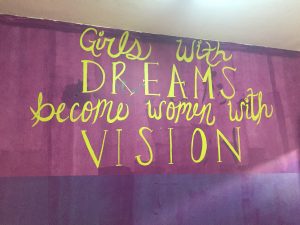
In many regions of the Global South, specifically post conflict regions, there is a ominous lack of democratic space. Public and community space is critical to the development and health of a community, region and nation. Democratic space provides citizens and civil society the ability to challenge and better understand the interface between citizens, government and policy development.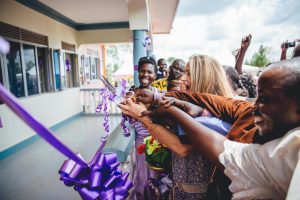
In addition, community space enables communities and civil society to gather, facilitate conversations and develop solutions to relevant and pressing issues.
The GWRC provides women and girls in Gulu, and neighboring districts, access to information and support through small group educational courses, including computer skills, helping them become more able to make informed decisions about their lives. The Center educates women about their health and well being, including access to family planning information, learning money management for economic empowerment and how to recognize and address domestic violence. In addition, the center will house the Peer Counseling and Access to Justice teams, WGEF staff, and hosting community interest events.
GWRC, 2021/22: Continuing to play a critical role in community development for women, girls and families!
- Housed in GWRC, the Access to Justice team received 835+ cases, including referrals from local legal aid and domestic violence organizations. Most cases are regarding gender based violence, land disputes and forced or early marriage. The AJ team is highly trained and respected to assist women thru the legal system, providing resources, support, safety and sisterhood.
- GWRC hosted 86 community meetings and dialogues, local and international events and celebrations. Including family mediations, International Women’s Day, Menstrual Hygiene Day. WGEF’s team of Peer Counselors helped 72 families find alternative solutions to forced marriage, protecting the human rights of girls.
- 1000+ people utilized GWRC’s resource library, critical, relevant and meaningful information provided to the community, including students and researchers.
- The McQuade Foundation Computer Lab receives on average 35-42 users every day; serving students, WGEF members, entrepreneurs, and the entire community. The computer training course graduated 327 young women in 2021; improving their skills and knowledge around technology and information.
- 28 Peer Counselors received ongoing training in advocacy, monitoring and self reliance to improve their technique, capabilities and leadership skills.
- Over the last year, 175 newly elected women leaders were trained in leadership, advocacy and public speaking; equipping them with the skills necessary to be effective public officials, representing constituents and fully participating in all areas of policy development.
- In 2020/21 GWRC printed and distributed nearly 1 million flyers with life saving information about COVID and public health.
Literacy
Women’s Global/VAC Net has developed a program that is effective and responsive to the needs of our clients.
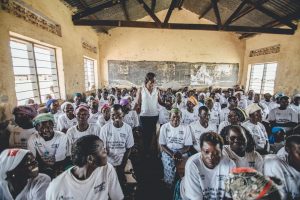 “When a woman learns to read and write, her whole world changes; possibilities and opportunities are created.” – Karen Sugar
“When a woman learns to read and write, her whole world changes; possibilities and opportunities are created.” – Karen Sugar
Our clients expressed a desire and excitement for a literacy program and in response, our literacy program began in July, 2008. We have had such an overwhelming response to the offering, we had over 100 women sign up for classes. Participants are divided into groups where they will be provided with materials, books, pens, etc. and attend classes twice a week for six months. Two instructors have been secured, and they will conduct training for additional facilitators to become trained instructors. As of August 2016, 1,400+ women have participated in our literacy program; in 2016, 409 women participated. In 2017 we have will be building capacity, reaching deeper into the rural areas where women have been marginalized and lack basic services and opportunities; our goal is 1500 participants, having 5 centers, two levels of learning.
Leadership Development
Our Leadership Development programs aim to advance the participation, access and voice of women in their communities in post conflict northern Uganda and other regions, districts and villages where women’s voices have 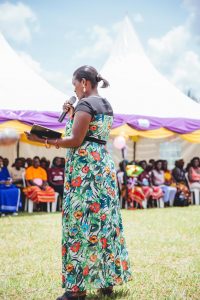 been marginalized. A unique opportunity exists in post conflict regions for women to seize the moment, reshaping and rebuilding societies and traditional political order. Our goal is to create a mechanism to elevate women’s legislative participation thru training initiatives promoting advocacy, activism; creating the space for women to run for elected office, manage campaigns increasing women’s representation at all levels of government.
been marginalized. A unique opportunity exists in post conflict regions for women to seize the moment, reshaping and rebuilding societies and traditional political order. Our goal is to create a mechanism to elevate women’s legislative participation thru training initiatives promoting advocacy, activism; creating the space for women to run for elected office, manage campaigns increasing women’s representation at all levels of government.
Justice is the foundation ensuring women become equal participants in decision making, development and their own futures. Without access to justice, women are disenfranchised and disempowered, experiencing violence, abuse and inequality. This initiative demands that women are viewed not as victims but as agents of change for social and economic justice.
To address violence against women, gender bias, inequality and gaps in the justice chain for women, this initiative strives to provide the critical information and resources, enabling women to know their legal and human rights within the justice system. The access to justice team consists of 12 women who manage a 24/7 hotline, assist in filing reports, supporting victims and families, advocate and assist during court proceeding all ensuring justice is served.
The A/J team is housed in GWRC and has become an important community based organization.
 WGEF clients have experienced empowerment, gained leadership skills, understanding of advocacy, legislative participation and policy development. Women in our program are leading in their communities, speaking out on important issues, advocating for women and families, challenging their leaders and community members to do better, moving their communities forward. In Jan 2021, 27 WGEF leaders ran for political office, across the region, with 21 successfully winning their contests. Through relevant and meaningful programs, WGEF has been able to offer women critical knowledge to transform their communities, creating a brighter and more secure future for themselves , their families, region and nation.
WGEF clients have experienced empowerment, gained leadership skills, understanding of advocacy, legislative participation and policy development. Women in our program are leading in their communities, speaking out on important issues, advocating for women and families, challenging their leaders and community members to do better, moving their communities forward. In Jan 2021, 27 WGEF leaders ran for political office, across the region, with 21 successfully winning their contests. Through relevant and meaningful programs, WGEF has been able to offer women critical knowledge to transform their communities, creating a brighter and more secure future for themselves , their families, region and nation.
WGEF believes that women are natural leaders, and when given opportunities and access will be a transformative force for peace, democracy, security and equality.
Our program is robust, and becoming a vital part of the community, offering women economic opportunity and a chance to create a better life for herself and her children. Our location in Gulu and reputation in the community bring in new clients, ideas and possibilities everyday.
Agriculture
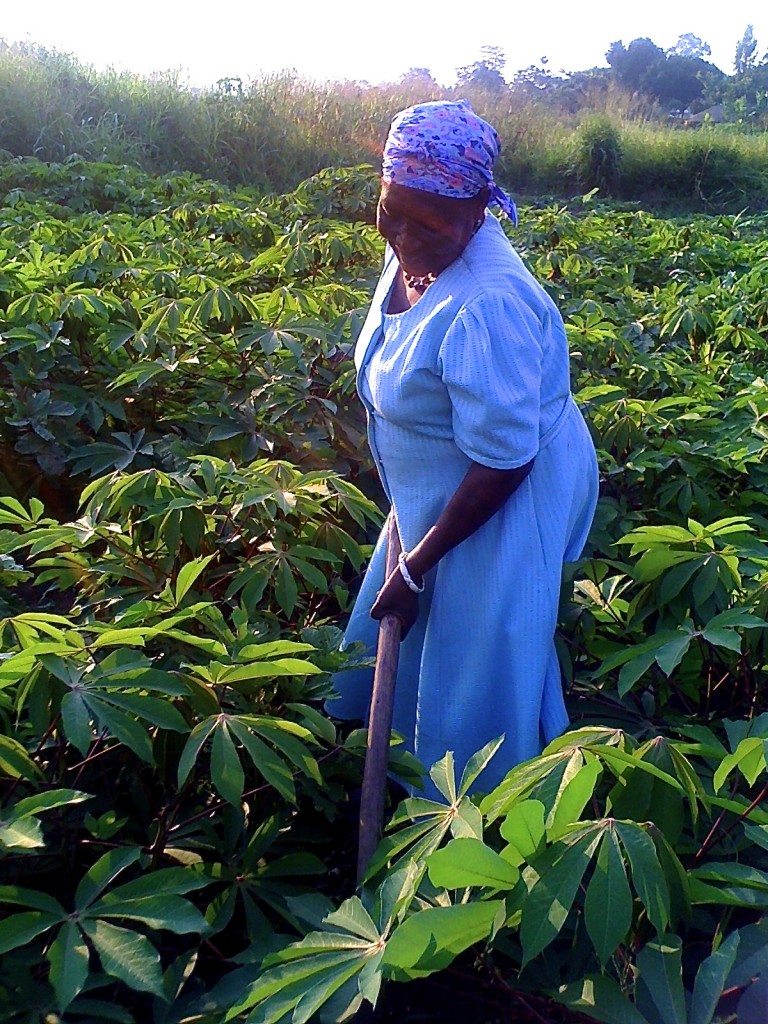 Women provide up to 90% of the rural poor’s food and produce, WGEF is supporting women farmers by offering agricultural loans and training. Help WGEF provide agricultural loans to women in northern Uganda!
Women provide up to 90% of the rural poor’s food and produce, WGEF is supporting women farmers by offering agricultural loans and training. Help WGEF provide agricultural loans to women in northern Uganda!
Northern Uganda is a post conflict region, with a temperate climate. While the food agencies have been there for decades, there are shortages; for the region to successfully recover and for peace to continue, the people of the region must begin to grow their own food, feeding themselves, their families and their communities. What we know is that women produce up to 80% of food in developing countries, WGEF is supporting women and farming projects thru our agricultural loan program.
The agricultural project will provide women with agricultural loans, training and support, ensuring that our clients are able to successfully plant, grow and harvest their crops. As of 2022, WGEF has supported over 2500+ women farmers and women in agribusiness, growing a diversity of crops increasing food security and economic empowerment across the region. Supporting women farmers is the way to create food security!
By funding the WGEF agricultural program, women will have the opportunity to create small to medium scale agricultural projects. Women comprise the majority of Africa’s farmers, playing a major role in farming, biodiversity and protecting nature.
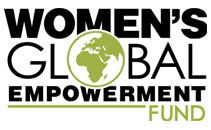 Women's Global Empowerment Fund
Women's Global Empowerment Fund

